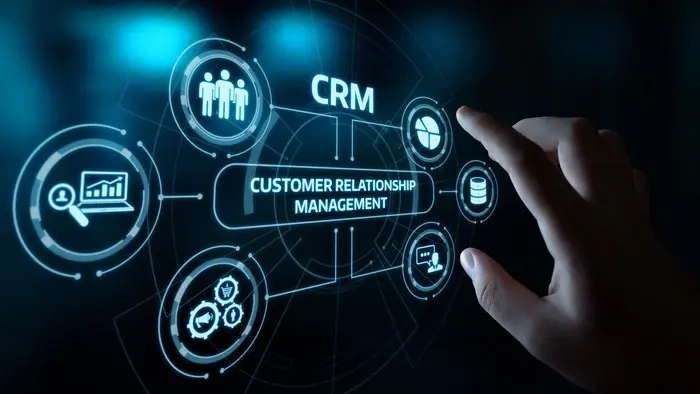Your CRM is Your Club’s Competitive Edge
This blog was updated for relevance and accuracy on October 29, 2025.
4 min read
 Kathy Heil
:
Updated on August 20, 2024
Kathy Heil
:
Updated on August 20, 2024
Editor's Note: This blog was originally published in 2015 and was updated in October 2023.
Chances are your business has some sort of CRM, (Customer Relationship Management Software) in place. The questions you need to be asking yourself are: "Are we using it to its fullest potential?" And, most importantly, "Is it helping us drive new business?"
For years, organizations have been investing big dollars in CRM technology. However, without the supporting investment in training and change management to drive the behaviors needed to make it work, companies aren't seeing the benefits of a CRM – or at least aren't seeing the level of benefits they'd like. The bottom line is that technology only works if people are disciplined and proficient at inputting, managing, and leveraging the data to help acquire and grow customer relationships.
One of the biggest challenges across sales and marketing organizations is that 99% of sales managers don’t know the amount of work a CRM takes, and don't know how to really use one to leverage more sales. The core problem is that salespeople believe it to be more of a sales management tool than a sales support tool.
What if all of this could change? Imagine a world of where your sales team is using a CRM because they want to, not because management is mandating it. Imagine the modern-day sales rep who inputs a contact record and the CRM auto-fills valuable details about their company and other key employees? Or how about a CRM that automatically pulls in useful social media profile details, making connecting on social media all that much easier? What if your sales team could place calls from your CRM with one click, and could log call notes and full recordings of your discussion automatically?
If the belief is that CRMs are time-consuming and cumbersome for sales reps, then perhaps you haven't explored the right CRM solution yet. You may have been looking at CRMs solely as a marketing tool rather than a sales enabler. However, when using HubSpot for private clubs, the platform is designed to streamline sales processes and improve member management, making it an ideal choice for organizations in this niche.
The HubSpot CRM is changing the perception of sales and marketing teams and is committed to helping foster sales enablement worldwide. Since HubSpot is offering its CRM for no charge (yes, it's FREE!) I thought I would share some of the many reasons we have come to know and love the HubSpot CRM:

Dissension in sales and marketing organizations is oftentimes rooted in assumptions. The sales team thinks that the marketing team doesn't actually know how to drive sales-qualified leads and that the leads it does get aren't good. Marketing thinks that salespeople "don't have a clue" how hard they are working to get their messaging out.
Organizations with good alignment between sales and marketing teams could achieve 19% faster revenue growth and 15% more profitability, among other measurable improvements. By contrast, companies with poor alignment saw revenues decline by 4%. A CRM is a perfect way to help the two sides accomplish shared goals. Some of the benefits are:
An astonishing 80% of companies have no process for nurturing sales leads! Lead nurturing has become an integral part of a successful marketing strategy—specifically when building relationships with potential buyers across multiple channels, even if they are not currently looking to purchase a product or service. Today’s potential buyers don’t become customers overnight—they require marketing over time as they self-educate and build trust with a company.
Lead nurturing helps marketers communicate consistently with buyers across different channels and throughout the sales cycle, and addresses the gap between when a lead first interacts with you and when she is ready to purchase. With the HubSpot CRM, you can easily set up a personalized workflow for any customer or prospect that will not only allow you to create and share standardized templates, but you can set up the timing of your email through the scheduling app. This allows you to put a process in place to support your busy sales team.
I have been in sales for more than 25 years and I can tell you first-hand that filling out sales reports and projections was one of the worst parts of my job... until now! Gone are the days of Excel spreadsheets. The HubSpot CRM automates sales and marketing reports at the touch of a button.
Today, the typical sales process happens across dozens of channels and many, many touchpoints. The HubSpot CRM is aware of it all, giving you useful bits of information when and where you need it, from the sales rep to the CEO. At all times, anyone with access can know exactly where the prospect is in the buying cycle. You can even see which emails have been opened and how engaged the prospect is in the sales process to project the likelihood of a close.
Don't get me wrong, there are many awesome CRMs in the marketplace today with more robust capabilities than HubSpot's. But if robust means that you don't use it effectively because it's complicated or sales-unfriendly then it might not be the one for you
I meet with a number of C-level executives and when we get to the subject of CRMs and how successful they are in deploying them, one of the most common responses I hear is, "We have one, we just don't use it!" I honestly can't understand how any sales and marketing organization today can exist without a CRM that is used from the top to the bottom of the organization. There has never been a more data-driven time in our culture to leverage sales enablement tools to give our sales organizations the greatest chance to succeed.
After all, if your sales team succeeds, it's likely your organization will succeed, too.

This blog was updated for relevance and accuracy on October 29, 2025.
![Choosing a CRM that Works for Your Private Club [Episode 18]](https://www.clubmarketing.com/hubfs/CCMBlogHeaderEp18.jpg)
The sales cycle in the private club industry can be a long one. It might even take years from the time a prospective member expresses interest to the...

When setting your marketing priorities, you have a lot to consider. You may be looking at revenue goals, past campaign successes, competitors'...